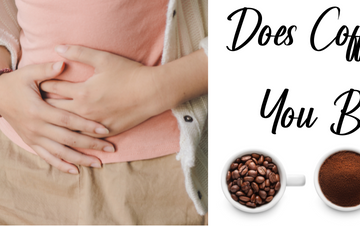Is Decaf Coffee a Diuretic?

I hope you already know what is decaf coffee? Today we will find out Is Decaf Coffee a Diuretic?
Of course, the benefits of consuming decaffeinated coffee will also be considered.
Let’s not procrastinate any longer and get started.
TABLE OF CONTENTS:
- What Is a Diuretic?
- Why Diuretic Is Important?
- What Is Decaf Coffee?
- Does Decaf Coffee Still Have Caffeine?
- What’s The Difference Between Regular Coffee and Decaf Coffee?
- Is Decaf Coffee a Diuretic?
- How Much Caffeine Do You Need to Start Peeing?
- The Diuretic Effect of Coffee
- Health Benefits of Decaf Coffee
- Should You Switch to Decaf Coffee?
What Is a Diuretic?
A diuretic is a drug used to increase diuresis. It aids in the excretion of more water from the body through urine. In a nutshell, it is a water pill that may cause a need to pee. It allows people to get rid of excess water and salt. There are several kinds of diuretics available.
Diuretics reduce the quantity of fluid in your arteries and veins. As a consequence, the risk of high blood pressure will be reduced. Diuretic medications may be used to treat various diseases and high blood pressure. These are useful for swelling tissues, heart failure, renal problems, and liver failure.
As previously indicated, many forms of diuretics may be used. In the present market, however, there are three primary categories. Potassium-sparing, loop, and thiazide diuretics are the three categories. All of these may help your body eliminate more water via pee.
Thiazide is the most often utilized of these three kinds. The rationale for this is that thiazide may be used to treat high blood pressure. The loop type may help to reduce the symptoms of heart failure. Potassium-sparing may help you get rid of fluids while keeping your potassium levels stable.
Even while diuretics have numerous health advantages, they are not without adverse effects. You may develop dizziness, headache, impotence, joint issues, dehydration, and muscle cramps when using diuretics.
Why Diuretic Is Important?
Diuretics, known as water tablets, are occasionally prescribed by doctors to rid the body of excess fluid or salt (sodium chloride). These medications are widely used to treat illnesses such as heart failure, high blood pressure, swollen tissues, and renal disease. But how can this assist you specifically?
Extra fluid in the body makes it harder for the heart and other organs to operate correctly. Allowing the outflow of excess fluid relieves the load on various organs. In addition, some individuals utilize diuretics to detox. This phrase relates to detoxification, which eliminates potentially hazardous poisons from the body, such as alcohol.
According to an early study, most people are aware of the idea of detox teas, which may aid with acne and even encourage weight reduction. Several different forms of tea have diuretic properties. Examples are green, black, white, oolong, peppermint, nettle, and fennel teas. But the issue remains: is decaf coffee a diuretic?
What Is Decaf Coffee?
Decaf coffee is made from decaffeinated coffee and has a reduced shelf life. This word may give you a hint as to what it refers to. Decaffeinated coffee is a form of coffee. At least 97 percent of the caffeine has been extracted or eliminated from the coffee beans.
Decaf coffee is particularly appealing to individuals who like coffee with less caffeine while still having distinct flavor and health advantages compared to regular caffeinated coffee.
Does Decaf Coffee Still Have Caffeine?
Yes, it is impossible to completely extract caffeine from coffee beans. Most decaf coffee preparation techniques remove slightly more than 97 percent of the caffeine. A regular 8-ounce cup may imply between 2 and 6 milligrams of caffeine.
Swiss Water Process decaffeinated coffee is the best option. These facilities are regularly inspected to remove at least 99.9% of the caffeine from coffee beans.
However, the decaffeination method is not the sole crucial component. The quantity of caffeine in the original beans and the roasting procedure (darker roasts are less caffeinated) will influence the amount of caffeine in your drink. Beans low in caffeine at the start, decaffeinated using the Swiss Water Method, and then dark roasted might contain less than 0.1 mg of caffeine.
What’s The Difference Between Regular Coffee and Decaf Coffee?
Any coffee enthusiast will tell you that there is a significant difference between regular and decaf coffee. Mostly in terms of taste and effect. However, apart from the tiny boost you receive from a cup of standard coffee, there are a few additional distinctions.
Decaf Coffee Has Less Caffeine
I did not state that decaf coffee had no caffeine. The reality is that decaffeinated coffee contains some caffeine. Even if you drink decaf, you’re still getting a little caffeine.
How much is it?
The United States Department of Agriculture permits 0.10 percent caffeine in a dry packet of decaf coffee. According to studies, brewing decaf coffee has at least 97 percent less caffeine than usual coffee.
Some coffee products claim caffeine-free. If you have caffeine sensitivity, you should look for products like these.
Decaf Coffee Has Fewer Antioxidants
When coffee is roasted, both regular and decaf coffee lose antioxidant components. On the other hand, decaf coffee goes through a further steaming decaf procedure, which causes it to lose even more. As a result, decaf coffee contains fewer chlorogenic acids than usual coffee.
Decaf Coffee Is More Acidic
Is Decaf Coffee Acidic, you ask? Have you ever noticed that decaf coffee lacks the balanced flavor of regular coffee? It’s due to an extra soaking step that allows decaf coffee to retain more acid.
Decaf Coffee Is Less Healthy Than Regular Coffee
In moderation, coffee is excellent, but decaf might have some unfavorable side effects. Here are three examples:
- Decaf coffee has been linked to an increase in LDL cholesterol.
- It may also increase the number of fatty acids in your system.
- Decaf coffee, unlike usual coffee, does not reduce your chance of getting heart disease.
Is Decaf Coffee a Diuretic?
As the name implies, decaffeination eliminates the overwhelming majority of caffeine from coffee. Any coffee (or tea!) may be decaffeinated, albeit this method does not eliminate every last particle (approximately 2 percent of caffeine remains). Nonetheless, it eliminates enough to render it essentially ineffective as a diuretic.
Of course, there are more reasons to select decaffeinated coffee. Even though it isn’t a diuretic, it’s an excellent option for caffeine-sensitive or pregnant folks. Indeed, many organizations advise pregnant women not to consume more than 200 mg of caffeine every day. There isn’t much to be concerned about when it comes to decaf coffee.
How Much Caffeine Do You Need to Start Peeing?
Whatever is going on within, the end outcome is the same: an increased urine flow. But how much caffeine in coffee beans is required to produce these diuretic effects?
On this point, there seems to be considerable debate. According to one expert, you’ll notice caffeine’s adverse effects on your bladder after roughly 300 milligrams. Another source, however, puts the figure as 500 mg of caffeine. Furthermore, according to the Mayo Clinic, the average daily caffeine consumption should not exceed 400 mg. So, how many cups do you drink every day?
A cup of coffee has around 100 milligrams. That translates to three to five cups of coffee every day and numerous trips to the restroom. But keep in mind that caffeine does not just originate from tea and coffee. There are also many caffeine-containing foods on the market, such as:
- Energy drinks – 91 milligrams per 8 ounces
- Soda – 49 milligrams per 16 ounces
- Dark chocolate – 24 milligrams per ounce
- Chocolate cake with frosting – 8 milligrams per slice
The Diuretic Effect of Coffee
Simply put (and honestly), the diuretic properties of coffee allow you to produce more pee. Does this, however, imply that coffee is dehydrating? Interestingly, no. Contrary to common opinion, and instead perplexingly given the circumstances, your morning cup of coffee adds to your daily fluid need. Caffeinated infusions may aid in urination, but they do not raise the risk of dehydration.
Confused? Please allow me to clarify. I’ve previously established (many times) that a diuretic works by enabling the body to create pee. However, excessive urination does not always result in dehydration unless you consume extra fluids. Take, for example, water. You urinate more when you drink a lot to keep hydrated. Despite this, you’re still hydrating yourself!
It’s also worth mentioning that coffee may be a mild laxative in certain circumstances. Some feel this is due to coffee acting as a stimulant, which may boost bile production and bowel movement. Research from 1990, on the other hand, reveals a different hypothesis. It seems that coffee consumption promotes rectosigmoid motility. To be honest, no one precisely understands how coffee works as a laxative.
Health Benefits of Decaf Coffee
Compared to regular coffee, decaf coffee is better for your health. This is because it gives various health advantages that conventional coffee does not. Decaf coffee is beneficial to health in more than one manner since it contains nutritional elements such as niacin, potassium, and magnesium. Let’s talk about it.
Reduce The Risk of Premature Death, And Type 2 Diabetes
Using both decaf and usual coffee lowers the risk of developing type 2 diabetes. One cup of coffee every day may cut the risk by 7%. New research discovered that decaf drinking reduced the chance of early mortality, although by a tiny amount. Decaf coffee drinkers had no or a short history of cardiovascular disease or stroke.
Protection Against Degenerative Diseases
Decaf coffee has a gradual influence on age-related brain diseases. It can lower the risk of degenerative illnesses such as Parkinson’s and Alzheimer’s.
Reduced Risk of Rectal Cancer and Symptoms of Heartburn
Acid reflux and heartburn are two damaging effects of consuming caffeinated coffee. However, decaf coffee might alleviate this adverse effect. Decaf coffee produces less acid reflux than regular coffee. Furthermore, consuming more than two cups of decaf coffee has been related to a 48% reduction in rectal cancer incidence.
Reduce Calorie Count and Helps in Weight Loss
In general, an 8-ounce cup of decaf coffee has 0 calories. As a result, creating a calorie deficit over time might be beneficial. And it will finally result in weight reduction. For one year, drinking one cup of decaf coffee five days a week may result in an 8-pound weight reduction.
Protects Liver
It protects your liver against liver enzymes, among other advantages to other body sections. Decaf coffee drinkers have low levels of liver enzymes.
Should You Switch to Decaf Coffee?
It is not advisable to convert from your daily average coffee consumption to decaffeinated coffee in the blink of an eye for no apparent reason. Because the transition is so abrupt, you will experience caffeine withdrawal symptoms such as headache, dizziness, exhaustion, and depression because your body cannot adjust so quickly.
However, suppose you find that regular coffee is not acceptable due to side effects such as diuretics and sleeplessness. In that case, you still want to consume coffee. Then decaf coffee is a good option. Just remember to approach the change process carefully, step by step, day by day, by limiting the amount of caffeine you drink to adjust before entirely converting to decaf consumption.
References:
- Maughan, R. J., & Griffin, J. (2003). Caffeine ingestion and fluid balance: a review. Journal of human nutrition and dietetics: the official journal of the British Dietetic Association, 16(6), 411–420. https://doi.org/10.1046/j.1365-277x.2003.00477.x
- Seal, A. D., Bardis, C. N., Gavrieli, A., Grigorakis, P., Adams, J. D., Arnaoutis, G., Yannakoulia, M., & Kavouras, S. A. (2017). Coffee with High but Not Low Caffeine Content Augments Fluid and Electrolyte Excretion at Rest. Frontiers in nutrition, 4, 40. https://doi.org/10.3389/fnut.2017.00040
- Killer, S. C., Blannin, A. K., & Jeukendrup, A. E. (2014). No evidence of dehydration with moderate daily coffee intake: a counterbalanced cross-over study in a free-living population. PloS one, 9(1), e84154. https://doi.org/10.1371/journal.pone.0084154
- Zhang, Y., Coca, A., Casa, D. J., Antonio, J., Green, J. M., & Bishop, P. A. (2015). Caffeine and diuresis during rest and exercise: A meta-analysis. Journal of science and medicine in sport, 18(5), 569–574. https://doi.org/10.1016/j.jsams.2014.07.017
- Seal, A. D., Bardis, C. N., Gavrieli, A., Grigorakis, P., Adams, J. D., Arnaoutis, G., Yannakoulia, M., & Kavouras, S. A. (2017). Coffee with High but Not Low Caffeine Content Augments Fluid and Electrolyte Excretion at Rest. Frontiers in nutrition, 4, 40. https://doi.org/10.3389/fnut.2017.00040
- Zhang, Y., Coca, A., Casa, D. J., Antonio, J., Green, J. M., & Bishop, P. A. (2015). Caffeine and diuresis during rest and exercise: A meta-analysis. Journal of science and medicine in sport, 18(5), 569–574. https://doi.org/10.1016/j.jsams.2014.07.017
- Rybakowska, I. M., Milczarek, R., Slominska, E. M., & Smolenski, R. T. (2018). Effect of decaffeinated coffee on function and nucleotide metabolism in kidney. Molecular and cellular biochemistry, 439(1-2), 11–18. https://doi.org/10.1007/s11010-017-3131-9
- Marx, B., Scuvée, É., Scuvée-Moreau, J., Seutin, V., & Jouret, F. (2016). Mécanismes de l’effet diurétique de la caféine [Mechanisms of caffeine-induced diuresis]. Medecine sciences : M/S, 32(5), 485–490. https://doi.org/10.1051/medsci/20163205015
- Nussberger, J., Mooser, V., Maridor, G., Juillerat, L., Waeber, B., & Brunner, H. R. (1990). Caffeine-induced diuresis and atrial natriuretic peptides. Journal of cardiovascular pharmacology, 15(5), 685–691. https://doi.org/10.1097/00005344-199005000-00001
- Reyes, C. M., & Cornelis, M. C. (2018). Caffeine in the Diet: Country-Level Consumption and Guidelines. Nutrients, 10(11), 1772. https://doi.org/10.3390/nu10111772
- Rodak, K., Kokot, I., & Kratz, E. M. (2021). Caffeine as a Factor Influencing the Functioning of the Human Body-Friend or Foe?. Nutrients, 13(9), 3088. https://doi.org/10.3390/nu13093088
- Killer, S. C., Blannin, A. K., & Jeukendrup, A. E. (2014). No evidence of dehydration with moderate daily coffee intake: a counterbalanced cross-over study in a free-living population. PloS one, 9(1), e84154. https://doi.org/10.1371/journal.pone.0084154







